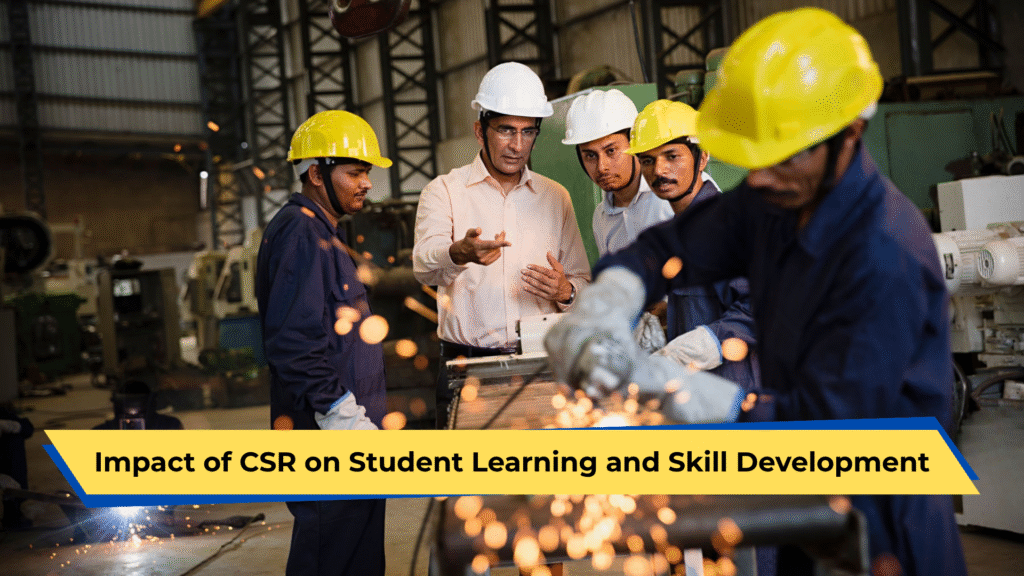The Unseen Classroom: How CSR is Revolutionizing Student Learning and Skill Development
In today’s dynamic world, the role of education extends far beyond textbooks. It’s about equipping the next generation with not just knowledge, but also practical skills and a mindset for lifelong learning. This monumental task isn’t solely on the shoulders of educational institutions; increasingly, Corporate Social Responsibility (CSR) initiatives are playing a transformative role.
Beyond traditional philanthropy, companies are strategically investing in programs that directly impact student learning and skill development, creating a powerful ripple effect across communities and the nation. But what exactly is the impact of CSR on education and skill enhancement in India? Let’s Start.
Understanding CSR’s Role in Education and Skill Development
Corporate Social Responsibility refers to a company’s commitment to operate ethically and contribute to economic development while improving the quality of life of the workforce, their families, as well as the local community and society at large. When applied to education and skill development, CSR initiatives often go beyond simple donations. They involve:
- Strategic Investments: Funding for infrastructure, technology, and learning resources.
- Program Design: Developing and implementing vocational training, mentorship, and experiential learning programs.
- Partnerships: Collaborating with schools, colleges, NGOs, and government bodies to amplify reach and impact.
The focus is on creating sustainable change, fostering employability, and building a future-ready workforce for India.
Key Areas of Impact: Where CSR Makes a Difference
CSR initiatives touch various facets of student learning and skill development, leading to tangible improvements:
Bridging the Resource Gap: Many schools and vocational training centers, especially in underserved regions, lack essential infrastructure, modern labs, libraries, and digital tools. CSR funds help build these facilities, provide necessary equipment, and even offer scholarships to deserving students, ensuring equitable access to quality education.
Curriculum Enrichment & Experiential Learning: Companies often bring their industry expertise directly into the classroom. This can involve:
- Developing industry-relevant modules.
- Providing real-world case studies and projects.
- Organizing industrial visits and internships, offering students invaluable practical exposure that traditional curricula might lack.
Mentorship and Career Guidance: A significant challenge for young learners, particularly in non-metro areas, is a lack of awareness about diverse career paths. CSR programs often establish mentorship initiatives where industry professionals guide students, share insights, and help them make informed career choices. This also includes providing psychometric testing to identify aptitudes, much like Model Career Centres do.
Vocational Training & Employability Programs: This is a cornerstone of CSR in skill development. Companies invest in demand-driven vocational training tailored to specific industry needs. Programs like the Recruit-Train-Deploy (RTD) Model (as championed by organizations like CII) directly address employability by:
- Recruiting eager youth.
- Providing specialized training.
- Ensuring direct job placement upon completion. This is particularly impactful for marginalized communities and for women’s economic empowerment.
Promoting Digital Literacy & Tech Integration: With the rapid pace of digitalization (think Digital India mission), digital skills are non-negotiable. CSR initiatives provide computers, internet access, and digital literacy training, especially in rural schools, ensuring students are not left behind in the digital revolution.
Fostering Holistic Development & Soft Skills: Beyond technical proficiencies, CSR programs recognize the importance of soft skills (like communication, problem-solving, teamwork, and critical thinking). Workshops on these vital skills, often integrated into vocational training, help students become well-rounded professionals prepared for the modern workplace.
Benefits Beyond the Classroom: A Win-Win for All
The impact of CSR on student learning and skill development extends far beyond the direct beneficiaries:
- For Students: Enhanced employability, direct access to jobs, increased confidence, better career awareness, and improved quality of life.
- For Communities: Reduced unemployment, improved economic stability, decreased social inequalities, and a stronger local talent pool.
- For Corporations: A readily available pool of skilled talent, enhanced brand reputation, stronger community relations, improved employee morale, and long-term business sustainability. It aligns their social mission with their business goals.
The Road Ahead: Ensuring Sustainable Impact
While the impact is profound, challenges such as scalability, ensuring long-term sustainability, and measuring precise outcomes remain. However, the growing commitment from leading corporations, often in collaboration with expert bodies like CII (which works through its Model Career Centres and platforms), signals a promising future. These partnerships ensure programs are industry-relevant, reach diverse beneficiaries, and contribute significantly to national skill missions.
Investing in Education is Investing in India’s Future
The synergy between corporate social responsibility and education/skill development is creating an “unseen classroom” – one that is agile, industry-aligned, and deeply impactful. By investing in student learning and skill development, companies are not just fulfilling a social obligation; they are making a vital investment in India’s human capital, fostering innovation, and building a stronger, more prosperous nation for generations to come.












































